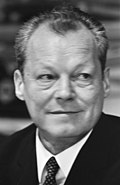
The Free Democratic Party is a liberal political party in Germany.

Kurt Georg Kiesinger was a German politician who served as the chancellor of West Germany from 1 December 1966 to 21 October 1969. Before he became Chancellor he served as Minister–President of Baden-Württemberg from 1958 to 1966 and as President of the Federal Council from 1962 to 1963. He was Chairman of the Christian Democratic Union from 1967 to 1971.

The Christian Democratic Union of Germany is a Christian democratic and conservative political party in Germany. It is the major catch-all party of the centre-right in German politics.
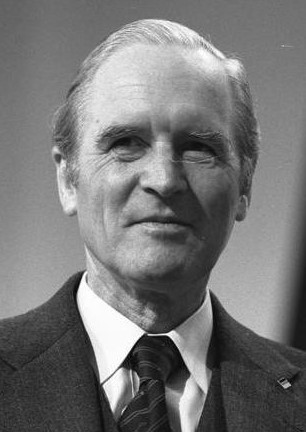
Karl Carstens was a German politician. He served as the president of West Germany from 1979 to 1984.

Herbert Richard Wehner was a German politician. A former member of the Communist Party, he joined the Social Democrats (SPD) after World War II. He served as Federal Minister of Intra-German Relations from 1966 to 1969 and thereafter as chairman of the SPD parliamentary group in the Bundestag until 1983.
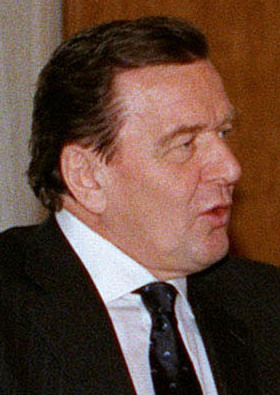
Federal elections were held in Germany on 27 September 1998 to elect the members of the 14th Bundestag. The Social Democratic Party (SPD) emerged as the largest faction in parliament for the first time since 1972, with its leader Gerhard Schröder becoming chancellor. The Christian Democrats had their worst election result since 1949.

Federal elections were held in Germany on 16 October 1994 to elect the members of the 13th Bundestag. The CDU/CSU alliance led by Helmut Kohl remained the largest faction in parliament, with Kohl remaining Chancellor in a narrowly re-elected coalition with the Free Democratic Party (FDP). This elected Bundestag was the largest in history until 2017, numbering 672 members.

Federal elections were held in West Germany on 6 March 1983 to elect the members of the 10th Bundestag. The CDU/CSU alliance led by Helmut Kohl remained the largest faction in parliament, with Kohl remaining Chancellor.
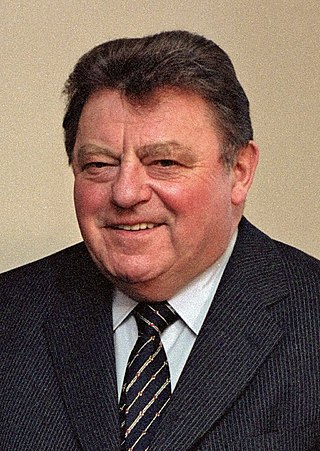
Federal elections were held in West Germany on 5 October 1980 to elect the members of the 9th Bundestag. Although the CDU/CSU remained the largest faction in parliament, Helmut Schmidt of the Social Democratic Party remained Chancellor.

Federal elections were held in West Germany on 3 October 1976 to elect the members of the 8th Bundestag. Although the CDU/CSU alliance became the largest faction in parliament, Helmut Schmidt of the Social Democratic Party remained Chancellor.
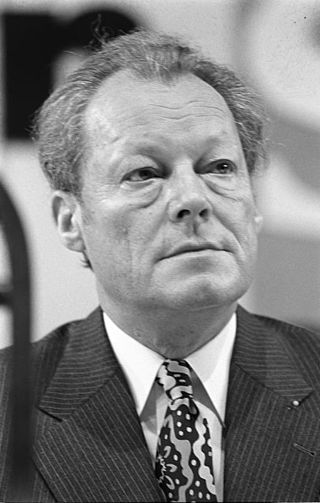
Federal elections were held in West Germany on 19 November 1972 to elect the members of the 7th Bundestag. In the first snap elections since the resumption of democratic elections in 1949, the Social Democratic Party became the largest party in parliament for the first time since 1930, winning 230 of the 496 seats. The coalition with the Free Democratic Party was resumed.

Federal elections were held in West Germany on 19 September 1965 to elect the members of the 5th Bundestag. The CDU/CSU remained the largest faction, while the Social Democratic Party remained the largest single party in the Bundestag, winning 217 of the 518 seats.

Federal elections were held in West Germany on 17 September 1961 to elect the members of the fourth Bundestag. CDU/CSU remained the largest faction, winning 242 of the 499 seats.

Federal elections were held in West Germany on 15 September 1957 to elect the members of the third Bundestag. The Christian Democratic Union and its longtime ally, the Christian Social Union in Bavaria, won a sweeping victory, taking 270 seats in the Bundestag to win the first – and to date, only – absolute majority for a single German parliamentary group in a free election.

Federal elections were held in West Germany on 6 September 1953 to elect the members of the second Bundestag. The Christian Democratic Union (CDU) emerged as the largest party.

Federal elections were held in West Germany on 14 August 1949 to elect the members of the first Bundestag, with a further eight seats elected in West Berlin between 1949 and January 1952 and another eleven between February 1952 and 1953. They were the first free federal elections in West Germany since 1933 and the first after the division of the country.

Federal elections were held in Germany on 18 September 2005 to elect the members of the 16th Bundestag. The snap election was called after the government's defeat in the North Rhine-Westphalia state election, which caused them to intentionally lose a motion of confidence to trigger an early federal election. The outgoing government was a coalition of the centre-left Social Democratic Party of Germany (SPD) and Alliance 90/The Greens, led by federal Chancellor Gerhard Schröder. The election was originally intended for the autumn of 2006.
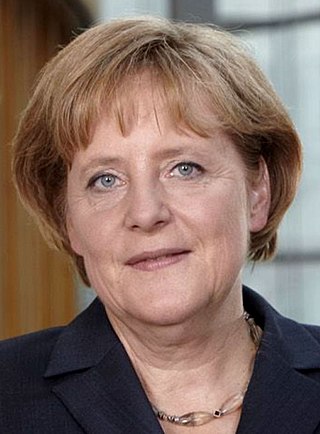
Federal elections were held in Germany on 27 September 2009 to elect the members of the 17th Bundestag.
Grand coalition is a term in German politics describing a governing coalition of the parties Christian Democratic Union (CDU) along with its sister party the Christian Social Union of Bavaria (CSU) and the Social Democratic Party (SPD), since they have historically been the major parties in most state and federal elections since 1949. The meaning of the term may change due to the growth of some formerly minor parties in recent years.
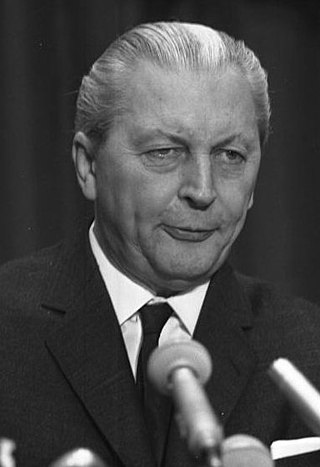
The Kiesinger cabinet was the 8th Government of the Federal Republic of Germany from 1 December 1966 to 22 October 1969 throughout the 5th legislative session of the Bundestag. It was led by the Christian Democratic Union's Kurt Georg Kiesinger, a former Nazi Party member. The Bundestag that had been chosen in the September 1965 election initially resulted in the Cabinet Erhard II, but when the Free Democratic Party resigned from the government, that led to the formation of the new cabinet. The cabinet was supported by the first grand coalition between the Christian Democratic Union (CDU), Christian Social Union of Bavaria (CSU) and the Social Democratic Party (SPD). The Vice-Chancellor was Willy Brandt (SPD)



